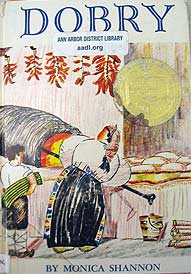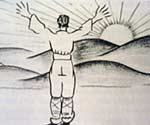 When I issued the July challenge, I was already several tens of pages into this book. I did not know I would be cutting it so close (July 31) in trying to finish before the end of the month. I read the final words this morning on the bus heading in to work.
When I issued the July challenge, I was already several tens of pages into this book. I did not know I would be cutting it so close (July 31) in trying to finish before the end of the month. I read the final words this morning on the bus heading in to work.I chose this book more or less randomly. When one is planning to read all Newbery books sooner or later, there is no wrong selection. They all "count" toward the end goal (and I am nothing if not goal oriented).
Yet the two things that drew me to the book once it was in my hands were the title and the cover illustration. The book had no jacket-cover preview. I was left to discern what I could from its appearance.
To this former student of the Russian Language, Dobry meant "Good." That word, above the amateurishly drawn domestic scene promised a sweet tale about what is good in peasant life. In that regard, the book did not disappoint. It was, in fact, about the simple yet satisfying work and rites of the people in a Bulgarian village.
[spoilers below]
 Surprisingly, Dobry turns out to be the protagonist's name. I don't know Bulgarian to know if it is also the word for "good," or if it is simply a name. The book gives us two years in Dobry's life. The first is when he's a boy of maybe 7-10 years. He helps around the house, relishes the outdoors, and displays a talent for art.
Surprisingly, Dobry turns out to be the protagonist's name. I don't know Bulgarian to know if it is also the word for "good," or if it is simply a name. The book gives us two years in Dobry's life. The first is when he's a boy of maybe 7-10 years. He helps around the house, relishes the outdoors, and displays a talent for art.The second section of the book takes place when Dobry is an adolescent. His artistic skills have blossomed into a rare gift the whole village recognizes.
What I found rewarding about the book were its accounts of everyday life in a mountain village before electricity or modern culture. Each chapter revealed something about how seasons were celebrated, traditions observed and relationships maintained.
Beyond that charming and no doubt rosified view, the book was not very good. It reminded me of the one Lois Lensky book I read, where very little happens and one is not given a reason to care about the characters. And ironically, the illustrations in this story about a budding artist, are bad. I can only guess they were supposed to look like folk art and have that unpolished composition. On more than one occasion, however, I could not tell what was happening in a photo until after I finished the chapter to which it corresponded.
Reading this book was like looking through a viewmaster. Each chapter was a different snapshot, and it didn't really matter where one began.



4 comments:
All I could think when I saw the title was "Dobby: Diary of a House-Elf". :-)
That would certainly be more entertaining!
Dobre is the Czech word for good, so maybe you are right - it is the same for all of the Slavic languages. This sounds like a book I would enjoy. I may have to move it up a bit in the queue!
Flusi
Interesting book with a different style, as if translated by a non-english speaker... but full of life and joy, which overcomes the cultural other-worldliness (if that's a word...) -- I enjoyed it, but not sure many kids would...
Post a Comment